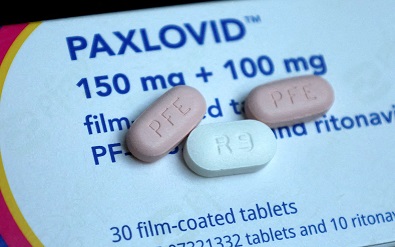COVID-19 News: American Study Shows That Except From Reduction In Thromboembolic Complications, Paxlovid Does Not Help In Treating Long COVID!
Nikhil Prasad Fact checked by:Thailand Medical News Team Oct 31, 2023 1 year, 5 months, 2 weeks, 6 days, 12 hours, 53 minutes ago
COVID-19 News: As the COVID-19 pandemic continues to impact the world, researchers are diligently working to uncover the long-term effects of the virus on survivors. These post-COVID-19 conditions (PCCs) or Long COVID encompass a wide range of medical issues that persist long after the acute phase of the disease. These conditions include cardiac, pulmonary, renal, gastrointestinal, neurologic, mental health, musculoskeletal, endocrine, and general health problems. A Centers for Disease Control and Prevention study revealed that a significant proportion of COVID-19 survivors, ranging from 20% of those aged 18 to 64 to 25% of those aged 65 and older, experienced PCCs potentially attributed to their previous COVID-19 infection.

Paxlovid or Nirmatrelvir-ritonavir, an antiviral medication, was recommended for the treatment of acute COVID-19, particularly for nonhospitalized individuals at high risk of developing severe disease. While previous research suggested the effectiveness of nirmatrelvir-ritonavir in reducing hospitalization and mortality during the first 30 days following COVID-19 infection, limited information was available regarding its impact on preventing PCCs that may persist well beyond the acute phase of the disease.
This
COVID-19 News report covers a recent study conducted by researchers from the Veterans Administration Puget Sound Healthcare System in the United States who sought to address this crucial gap in our understanding. This retrospective target trial emulation study aimed to compare the effectiveness of outpatient treatment with nirmatrelvir-ritonavir in preventing PCCs among nonhospitalized veterans in the Veterans Health Administration (VHA) system. The study evaluated a wide range of PCCs, encompassing various organ systems and conditions.
Study Findings
The study analyzed data from a substantial number of participants, including 9593 individuals treated with nirmatrelvir-ritonavir and their matched untreated counterparts. The research focused on the cumulative incidence of 31 potential PCCs over a period of 31 to 180 days after the initiation of treatment or a matched index date.
The key findings of the study can be summarized as follows:
-Reduced Risk for Combined Thromboembolic Events: Out of the 31 potential PCCs, nirmatrelvir-ritonavir was associated only with a reduced risk for combined thromboembolic events, including venous thromboembolism (VTE) and pulmonary embolism (PE). The risk of experiencing these events was 35% lower in the nirmatrelvir-ritonavir group, indicating a potential benefit in preventing thromboembolic complications.
-Similar Incidence of Most PCCs: The study found that nirmatrelvir-ritonavir treatment did not result in a significantly lower risk for most of the individual PCCs examined or for PCCs grouped by organ system. This suggests that the antiviral medication may not be effective in reducing the occurrence of various post-COVID-19 conditions, such as cardiac, pulmonary, renal, gastrointestinal, neurologic, mental health, musculoskeletal, and endocrine symptoms.
-Limitations
and Considerations: The study did acknowledge certain limitations, including the potential inaccuracy of PCC ascertainment using International Classification of Diseases, 10th Revision codes. Additionally, the evaluation of multiple outcomes could have led to spurious associations with combined thromboembolic events by chance.
Discussion
The results of this comprehensive study on the effectiveness of nirmatrelvir-ritonavir in preventing post-COVID-19 conditions provide important insights for clinicians and policymakers. While previous studies and real-world data had suggested a beneficial impact of this antiviral medication in reducing hospitalization and mortality during the acute phase of the disease, this study's findings question its effectiveness in preventing PCCs.
The observed reduction in the risk of combined thromboembolic events is noteworthy, as it suggests a potential benefit in preventing life-threatening blood clots in COVID-19 survivors. However, it is crucial to consider this result in the context of the broader range of post-COVID-19 conditions that were not significantly affected by nirmatrelvir-ritonavir treatment.
The study's findings raise important questions about the long-term management of COVID-19 survivors. With PCCs affecting multiple organ systems and causing a variety of symptoms, it is evident that a one-size-fits-all approach may not be effective in addressing the complex and diverse needs of these individuals. Healthcare providers and researchers must continue to explore and develop targeted strategies for managing PCCs and improving the quality of life for COVID-19 survivors.
Furthermore, this study underscores the need for additional research to understand the underlying mechanisms and risk factors associated with PCCs. The development of effective interventions and treatments for these conditions is essential to ensure the well-being of COVID-19 survivors and reduce the burden on healthcare systems.
Conclusion
In conclusion, the study conducted by the Veterans Administration Puget Sound Healthcare System provides valuable insights into the effectiveness of nirmatrelvir-ritonavir in preventing post-COVID-19 conditions among nonhospitalized veterans. While the medication appears to reduce the risk of combined thromboembolic events, it does not demonstrate a significant impact on most individual PCCs or those grouped by organ system.
These findings emphasize the complexity of managing PCCs and highlight the need for tailored approaches to address the diverse range of medical issues faced by COVID-19 survivors. As the COVID-19 pandemic continues to evolve, ongoing research and clinical efforts are essential to improve the long-term outcomes and quality of life for those affected by this disease. Further investigations into the prevention and treatment of post-COVID-19 conditions are warranted to provide better care and support for individuals on their road to recovery.
The study findings were published in the peer reviewed journal: Annals of Internal Medicine.
https://www.acpjournals.org/doi/10.7326/M23-1394
For the latest
COVID-19 News, keep on logging to Thailand Medical News.
